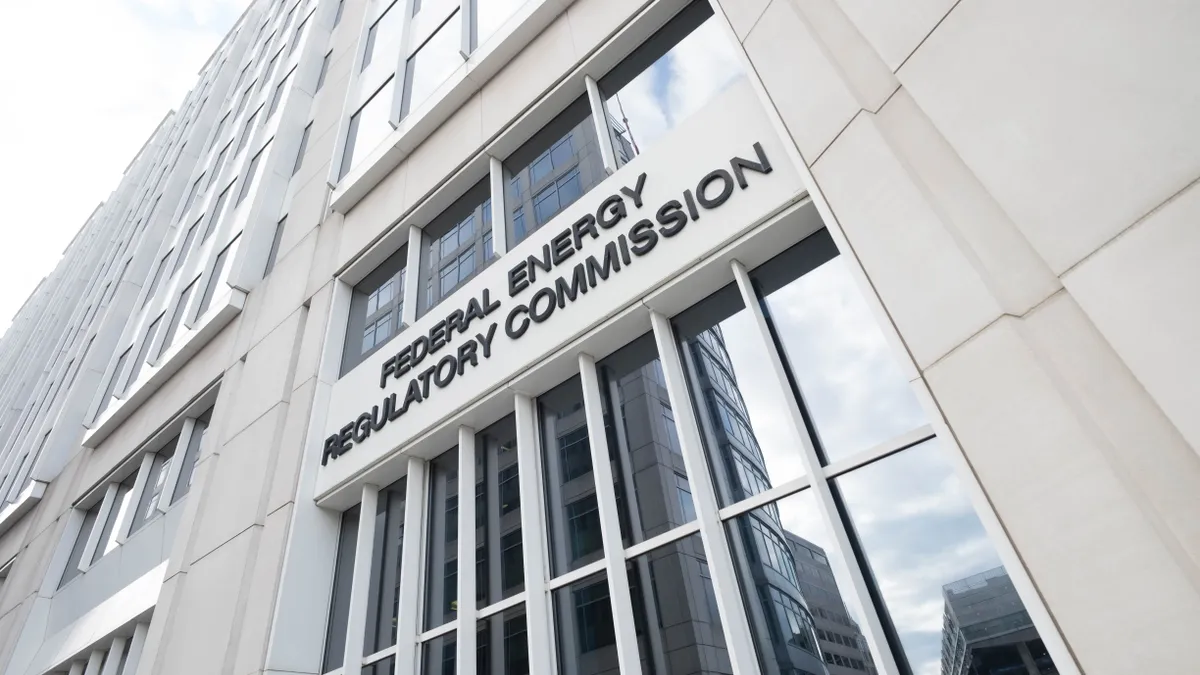Dive Brief:
-
Eleven attorneys general called for the Federal Energy Regulatory Commission to "advance, not impede" state clean energy policies in a Monday letter.
-
Specifically, the attorneys general urged FERC to "promote market design choices that appropriately recognize the rights of states under the Federal Power Act to shape their resource mixes," a key debate between states and primarily multi-state eastern regional transmission operators, such as ISO New England and the PJM Interconnection.
-
Gas additions are a primary area of tension as more states pursue aggressive renewable portfolio standards and argue that current market rules favor on-site fuel capacity over clean energy technologies.
Dive Insight:
Tensions between grid operators and states over how resources should be valued on the grid have been rising as state demand for clean energy technologies increases. The eleven attorneys general span six wholesale electricity markets, though over half come from the PJM and ISO-NE regions.
Coal and gas generators, largely in the ISO-NE and PJM markets, have been arguing state policies supporting nuclear and renewable energy are discriminatory and distort the market because of benefits those resources receive through renewable energy credits (RECs) or zero emissions credits (ZECs). PJM has proposed strategies to neutralize this practice, which FERC rejected in June of 2018, and its capacity market remains in limbo as states push for the ability to prioritize low-cost, carbon-free energy.
Coal and gas are "only being discriminated against to the extent that there is an externality cost associated with their energy that everyone seems to agree should be reflected in the market price through a carbon price," Michael Hogan, senior advisor at the Regulatory Assistance Project, told Utility Dive. "And unless and until it is, it is being reflected in the purchasing activities of the states. Pure and simple it's demand, not a distortion."
The attorneys general also called for FERC to "eliminate barriers to competition" for clean energy technologies. There are unwarranted inconsistencies in the ways the capacity markets treat zero-carbon vs fossil resources, said Hogan, but some argue the more fundamental issue is whether resources are being properly valued.
"The problem is capacity markets themselves are flawed because they're buying the wrong thing," he said. "The issue in the decarbonized power system is no longer capacity. It's resource capabilities."
Attorneys general have an increasingly important role to play in supporting the ability of states to push their climate and clean energy goals, according to a recent report from New York University School of Law's State Energy and Environmental Impact Center.
In the past few years, attorneys general have been in the middle of a number of debates between their states and federal regulators, including in response to FERC's implementation of the Natural Gas Act, the DOE's proposed rule on resilience-based pricing that would have favored baseload generators, FERC's failure to evaluate environmental impacts of new gas infrastructure, among other battles.
Mandatory capacity markets are one area of concern — under some market rules, reliability concerns pave the way for cheap natural gas buildouts, Jessica Bell, clean energy attorney and author of the NYU report told Utility Dive in September.
"Particularly the eastern RTOs and ISOs are set up in such a way that natural gas is sort of the 'go-to' for new generation," she said.
Those dynamics have played out in a number of states, including Connecticut where a proposed natural gas plant is drawing criticisms from environmentalists and regulators, with the latter blaming grid operator-imposed constraints for driving those investments.
Connecticut was one of the states that signed on to Monday's letter along with Massachusetts and Rhode Island (under ISO-NE), Pennsylvania, Delaware, Maryland and the District of Columbia (under PJM), and then California, Oregon, North Carolina and Michigan.
The attorneys general from D.C., Delaware and Maryland have previously asserted their concerns over state's rights in relation to PJM. Connecticut, D.C. and California all have 100% clean energy goals along with high renewable portfolio standards.
"The Commission's actions, including decisions related to market design, siting of new gas pipelines and storage facilities, and grid reliability, significantly affect our states' abilities to achieve our clean energy and climate goals," wrote the attorneys general. "Decisions made today will shape the electricity system for decades to come."














